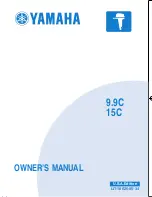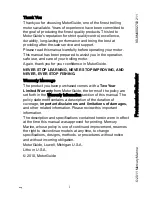
Operation
38
EMU27104
Pre-operation checks
WARNING
EWM00081
If any item in the pre-operation check is
not working properly, have it inspected
and repaired before operating the out-
board motor. Otherwise an accident
could occur.
CAUTION:
ECM00120
Do not start the engine out of water. Over-
heating and serious engine damage can
occur.
EMU31551
Fuel
●
Check to be sure you have plenty of fuel
for your trip.
●
Make sure there are no fuel leaks or gaso-
line fumes.
●
Check fuel line connections to be sure they
are tight (if equipped Yamaha fuel tank or
boat tank).
●
Be sure the fuel tank is positioned on a se-
cure, flat surface, and that the fuel line is
not twisted or flattened, or likely to contact
sharp objects (if equipped Yamaha fuel
tank or boat tank).
●
Check the water in the fuel filter with the
water separator warning device. Place the
remote control lever / gear shift lever in
neutral and turn the main switch to
“
”(on). If the buzzer sounds and the wa-
ter separator-warning indicator blinks,
consult your Yamaha dealer immediately.
EMU27130
Controls
●
Check throttle, shift, and steering for prop-
er operation before starting the engine.
●
The controls should work smoothly, with-
out binding or unusual free play.
●
Look for loose or damaged connections.
●
Check operation of the starter and stop
switches when the outboard motor is in the
water.
EMU31721
Stop switches
●
Confirm that turning the main switch to the
“
” (off) position stops the engine.
●
Confirm that removing the clip from the en-
gine shut-off switch stops the engine.
●
Confirm that the engine cannot be started
with the clip removed from the engine
shut-off switch.
EMU27150
Engine
●
Check the engine and engine mounting.
●
Look for loose or damaged fasteners.
●
Check the propeller for damage.
●
Check that the battery is in good condition
and the battery connections are secure.
EMU27163
Checking the engine oil level
1.
Put the outboard motor in an upright po-
sition (not tilted).
2.
Remove oil dipstick and wipe it clean.
3.
Completely insert the dipstick and re-
move it again.
4.
Check the oil level using the dipstick to
be sure the level falls between the upper
and lower marks. Fill with oil if it is below
the lower mark, or drain to the specified
level if it is above the upper mark.
















































